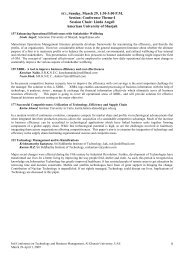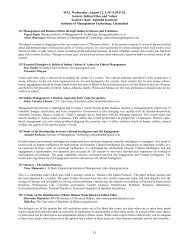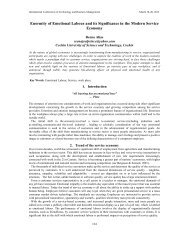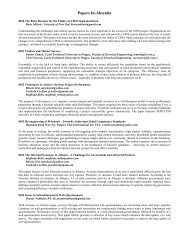Contributed Papers - Icmis.net
Contributed Papers - Icmis.net
Contributed Papers - Icmis.net
Create successful ePaper yourself
Turn your PDF publications into a flip-book with our unique Google optimized e-Paper software.
2A-6, Sunday, January 2, 9:20-10:40 A.M.<br />
Session: Finance-II<br />
Session Chair: Pankaj Trivedi<br />
K.J. Somaiya Institute of Management Studies and Research<br />
8318 Cointegretion Analysis of Tax Revenue and Macroeconomic Factors<br />
Monica Singhania, University of Delhi, monica@fms.edu<br />
Akshay Gupta<br />
This paper develops an econometric model for tax revenue forecasting in India. The paper uses data relating to actual collection of<br />
gross tax revenue, GDP at current market prices, inflation and external trade over period 1981-1982 to 2009-2010 to determine the<br />
gross tax revenue forecasts for financial year 2010-2011. The present paper develops model in Indian context using cointegration<br />
analysis. The paper forecasts gross tax revenue for financial year 2010-2011 using newly designed model. No major research<br />
study focusing on building econometric model for forecasting tax revenue has been carried out in India till date.<br />
8322 Financial Literacy: A path for inclusive growth in India<br />
Pankaj Trivedi, K.J. Somaiya Institute of Management Studies and Research, trivedi@simsr.somaiya.edu<br />
Ever since the new economic policy is adopted by India, inclusive growth is a matter of debate. There are conflicting views about<br />
the benefits of new economic policy reaching to the bottom of the population. Financial inclusion is one of the measures taken by<br />
RBI and Government of India to achieve inclusive growth. However, simply opening of no frill account by the poor population is<br />
not enough for inclusive growth. Educating the people with financial literacy programme is the need of the hour. How financial<br />
literacy is useful for inclusive growth is discussed in detail in this paper.<br />
8363 Personal Investment Preferences: An empirical study<br />
Shreenivasan Ananthan Kuppa, SASTRA University, shreenika@yahoo.com<br />
Vaijayanthi Panchanathan, SASTRA University, panchanathanvaijayanthi@gmail.com<br />
Researches confirm inadequate savings in inappropriate funds. Uncertain savings / investment behaviors result in unutilized<br />
financial resources. This study investigates the influence of economic / demographic factors associated with the levels of income,<br />
savings, and investments; whether the divides of gender, geographic and Wage /Non-wage influence this behavior. t & chi-square<br />
tests, regression tests were used on the financial profiles and portfolios of the 225 stratified random respondents from Vellore,<br />
Kanchipuram & Thiruvannamalai districts. The findings would help Government bodies /policy makers channelize the population<br />
in judicial saving, and in educating appropriately for optimal utilization of limited resources.<br />
8374 Attitudinal Behaviour of Active Market Participants in Selection of Portfolio<br />
Goutham Karthik, PSG Institute of Management, goutham200589@gmail.com<br />
Priyadarshini, Mogan, PSG Institute of Management, darshini.mohan@gmail.com<br />
P. Varadharajan, PSG Institute of Management,<br />
The investors’ greed and sentiments are the major cause in forecasting stock prices. “Active Market Participants” denote people<br />
who trade more than twice a month. Active market participants are classified into high self-monitors, whose behavior is attuned to<br />
create impressions that gain advantage and low self-monitors, who least cares about profit or loss, in a given situation. The<br />
analysis is based upon a survey conducted with Chennai based online traders. The study aims at learning investment pattern, time<br />
taken for deciding on investment, selection of portfolio, grouping the investors based on the self-monitoring scale.<br />
9015 Technology Intervention for Low Cost Business Model- MICROTECH INDIA<br />
Rahul Singh, BIMTech, rahul.singh@bimtech.ac.in<br />
Aditi Kumar, Birla Institute of Management Technology, aditi.kumar11@bimtech.ac.in<br />
Microbusiness Technology India, a U.S. based alternate payment solution providing organization, has been engaged in disbursing<br />
government payments such as social security, welfare and pension payments available to the beneficiaries through smart cards in<br />
many developing countries by eliminating cash transfer mechanism from the system. In 2008, company decided to enter in<br />
payment solution <strong>net</strong>work to the Indian market. On the directive to expand business in India, his team analysed the market and<br />
financial feasibility of company to provide alternate payment solutions to the under-banked population in India.







